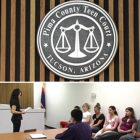
Experts Praise Use of Youth Courts in School Discipline
|
An OJJDP-sponsored webinar last week discussed the merits of youth courts as an alternative school disciplinary approach.
Juvenile Justice Information Exchange (https://jjie.org/tag/community-based-alternatives/page/7/)

An OJJDP-sponsored webinar last week discussed the merits of youth courts as an alternative school disciplinary approach.

DALTON, Ga. -- “This is a very crucial day in the state of Georgia,” said Gov. Nathan Deal Thursday at the Elbert Shaw Regional Youth Detention Center, where he signed into a massive reform package that rewrites the state’s juvenile code.

Early in 2000, after a groundbreaking study revealed epidemic levels of mental illness among detained youth in Cook County – plus a severe lack of counseling and treatment – the Illinois Department of Human Services launched an ambitious new Mental Health and Juvenile Justice Initiative.

The Nebraska Legislature has pushed forward a proposed piece of juvenile justice reform legislation, following a judiciary committee re-write, the Omaha World-Herald reports. Legislators approved amendments Tuesday to Legislative Bill 561. If passed, the proposal would reroute the state’s estimated 3,500 juvenile offenders away from Nebraska’s Department of Health and Human Services and place them under the authority of the state Office of Probation Administration instead. Although the bill’s original language called for the closing of two facilities in the cities of Kearney and Geneva, the recent rewrite would keep the two centers open, albeit, with stricter standards in place. Further, the proposed legislation would establish new re-entry processes for young people leaving the two facilities, and encourage counties to implement diversion programs for juvenile offenders.

The restorative justice program here in Athens, Ga., after almost two years of relationship and capacity building, is finally getting off the ground. Georgia Conflict Center has gotten some referrals from the juvenile court and we have started reaching out to parents whose kids have been charged with crimes, and to victims and parents of victims.
I called a woman recently who had filed a criminal complaint after her daughter was threatened by a fellow student. First she went to the school, explained the situation to the administration, and asked to be put in touch with the other kid’s mom. She wanted to settle the problem between the parents of the kids. The school refused, stating liability concerns, and instead put her in contact with the school resource officer.

Arresting young people too often turns them in to adults who get arrested, creating a so-called school-to-prison pipeline, say some juvenile justice experts. One way to break that cycle is to intervene early, but it takes a lot of community partners. “Not every kid who does something needs to go to juvenile court. That’s what we try to get across to our administrators,” said John Hall, from the Memphis, Tenn. school system’s School House Adjustment Program Enterprise at an Atlanta conference on Thursday.

When 15-year-old Hadiya Pendleton was shot and killed at a Chicago playground just a few days after performing at President Obama’s inauguration in January, First Lady Michelle Obama flew to Chicago to attend Pendleton’s funeral. At President Obama’s State of the Union speech, Pendleton’s parents sat next to the first lady. Now, Michelle Obama is heading back to her hometown to join Chicago Mayor Rahm Emanuel, the president’s former chief of staff, in urging the city’s business and philanthropic communities to raise $50 million for community-based programs to help at-risk young people. She will speak at an April 10 lunch meeting called “Working Together to Address Youth Violence in Chicago,” which will be attended by members of several civic organizations, including the Commercial Club, the Economic Club, the Executives’ Club, and World Business Chicago, the White House announced yesterday. The meeting is the result of an initiative led by two CEOs, Tom Wilson of Allstate and Jim Reynolds of Loop Capital, according to Emanuel’s office.
SPARTA, Ga.––Prisons are not inviting places. At their worst, they are a place of sorrow. At their best, prisons are a place to wait out the dull, slow passage of time. Prisons are not naturally a place of hope. Hancock State Prison, a concrete outpost in the sparsely-populated, wooded expanse of east-central Georgia, is no different.
For teens sentenced as adults under Georgia’s SB 400, a paucity of resources create reentry challenges (and increased likelihood of recidivism) upon release
ATLANTA––In the best of situations, teen boys struggle with growing into good men. The challenge becomes enormous for Georgia teens convicted in adult court of certain violent crimes—the so-called Seven Deadly Sins—and subsequently locked away in adult prisons. In 1994, responding to rising juvenile crime rates and fears of a generation of teen “super-predators,” Georgia passed legislation requiring any kid age 13 to 17 accused of committing one of seven serious, violent crimes be transferred out of the juvenile system to face an adult court. Conviction meant a mandatory minimum sentence of 10 years with no parole. With few positive role models and few opportunities for education while inside the prison walls, many former inmates convicted under the law say they are ill-prepared for life on the outside—a life requiring Social Security numbers, credit scores, balanced checkbooks and an entirely different set of interpersonal skills than those they’d learned in prison.
The Center for Sustainable Journalism (CSJ) at Kennesaw State University, publisher of the Juvenile Justice Information Exchange and Youth Today, last week announced it received a $100,000 gift from The Harnisch Family Philanthropies to advance the center’s mission of covering youth issues. Leonard Witt, executive director of the center, said the longtime support from Ruth Ann Harnisch, president of the Harnisch Foundation, and her husband William Harnisch, president and CEO of Peconic Partners, have been instrumental in the center’s growth over the years. “We wouldn’t be here if it hadn’t been for Ruth Ann Harnisch and her vision of what we could be,” Witt said. The grant, he continued, will allow the center to continue to provide a national forum for youth justice issues and publish “more high quality, ethically sound journalism.”
“The Center for Sustainable Journalism team has rapidly become the nation’s leading source of news and opinion about children who need help and are somewhere in the system,” Ruth Ann Harnisch said upon announcing the gift. “The center produces the most important journalism available for people who work with youth in education, criminal justice and social services, as well as for concerned parents and citizens.”
Harnisch continued: “This work is growing so fast that it requires more investment.